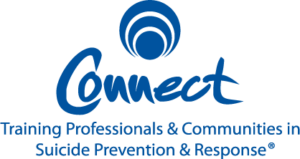suicide prevention
Recognize the Warning Signs for Suicide to Save Lives!
What are warning signs for suicide?
Warning signs are changes in a person’s behaviors, feelings and beliefs about oneself that are out of character for that individual and place them at risk for suicide. How (or even if) individuals display any warning signs is likely to be different from individual to individual. However, there are common traits that have been observed (either before or after the fact) in individuals who are contemplating suicide. Individuals who are displaying these warning signs should be asked directly if they are thinking of hurting or killing themselves and should be referred to a qualified physician or mental health practitioner for a full assessment.
A downloadable warning signs handout is available here.
Take action if you see any of the following warning signs:
- Talking about or threatening to hurt or kill oneself
- Seeking firearms, drugs, or other lethal means for killing oneself
- Talking or writing about death, dying, or suicide
- Direct Statements or Less Direct Statements of Suicidal Intent: (Examples: “I’m just going to end it all” or “Everything would be easier if I wasn’t around.”)
- Feeling hopeless
- Feeling rage or uncontrollable anger or seeking revenge
- Feeling trapped – like there’s no way out
- Dramatic mood changes
- Seeing no reason for living or having no sense of purpose in life
- Acting reckless or engaging in risky activities
- Increasing alcohol or drug use
- Withdrawing from friends, family, and society
- Feeling anxious or agitated
- Being unable to sleep, or sleeping all the time
What are Risk Factors?
Risk factors are influences that make it more likely that individuals will develop a mental health problem. They include biological, psychological, or social factors in the individual, family, or community. The more risk factors a person has, the more he/she is at risk for suicide and other self-destructive behaviors, such as substance abuse.
Individual Risk Factors
- Mental health problems, including depression, bipolar disorder, and anxiety disorders
- Alcohol and other substance use problems
- Loss (due to death, relationship, job, or status)
- Poor impulse control
- Feelings of hopelessness, helplessness, powerlessness, or desperation
- History of trauma or abuse (e.g. physical, mental, or sexual)
- Prior suicide attempt (significantly increases risk)
- Fascination with death and violence
- History of bullying or interpersonal violence
- Confusion or conflict about sexual orientation/identity
- Compulsive, extreme perfectionism
Family Risk Factors
- Family history of suicide
- Depressed and/or suicidal parents
- Alcoholic and/or drug-addicted parents
- Changes in family structure (e.g. death, divorce, remarriage, frequent moves/relocation)
- Financial difficulties
Community Risk Factors
- Access to lethal means, e.g. firearms or other lethal means
- Stigma associated with help-seeking
- Lack of access to helping services
- Loss of family, friends, or idols to suicide
- Anniversary of someone else’s suicide or other death
- Incarceration or loss of freedom; trouble with the law
This list of risk factors was developed by the National Center for Suicide Prevention Training.
What are Protective Factors?
Protective factors are influences that make it less likely that individuals will develop a mental health problem. They include biological, psychological, or social factors in the individual, family, or community. Protective factors help to lower the risk level of suicide and other self-destructive behaviors. These are strengths that we can develop and enhance for citizenry in our community.
Individual Protective Factors
- Abstinence from alcohol and other drugs
- Help-seeking behavior
- Friends and supportive significant others
- Hope for the future
- Having goals
- Pets/Connectedness to others
- Good problem-solving skills
- Medical compliance and a sense of the importance of health and wellness
Family Protective Factors
- Strong interpersonal bonds, especially with family and adults
- Family cohesion
- Parental presence at key times
- Cultural and religious beliefs that discourage suicide and support self-preservation
- Ability to cope and handle crises
Community Protective Factors
- Reasonably safe, stable environment
- Effective care for mental and physical health and substance use problems
- Availability of counseling or trusted adult in the life of a youth
- Restricted access to firearms or other lethal means
- Opportunities to contribute/participation in school and/or the larger community
This list of risk factors was developed by the National Center for Suicide Prevention Training.
If you see warning signs and/or are otherwise worried that this person:
Connect with Your Loved One, Connect Them to Help
- Ask directly about their suicidal feelings. Talking about suicide is the first step to preventing suicide!
- Let them know you care.
- Keep them away from anything that may cause harm such as guns, pills, ropes, knives, vehicles
- Stay with them and get a professional involved.
- Offer a message of hope – Let them know you will assist them in getting help.
- Connect them with help:
For an emergency, dial 911
National Suicide and Crisis Lifeline:
- 988 Suicide & Crisis Lifeline – Call or text 988
- TTY 800-799-4889
- En Español 1-888-628-9454
- Lifeline Chat
- Text HOME to 741741 in the US
Research shows that attempt survivors have an increased risk for suicidal behaviors. If you are an attempt survivor reading this, it is very important for you to access helping supports and resources, such as close family and friends, the 988 Suicide & Crisis Lifeline, and those listed below.
Connect with Help (Additional Supports) in the Community:
- Pastoral counselor
- Primary care provider
- Other qualified professionals
- School nurse/guidance counselor
Please visit the Crisis Help page for additional telephone numbers and helping supports and resources. Attempt survivors are strongly encouraged to seek out counseling resources as well.
Learn about Peer Support Agencies and Attempt Survivor Groups in NH.
How to Talk to Children and Youth
The US Department of Veteran Affairs has developed a series of fact sheets on how to talk to children and youth in different age groups about a suicide attempt in your family. These facts sheets are available below.
It may also help to hear about the experiences of individuals who have survived a suicide attempt. The Suicide Prevention Resource Center (SPRC) maintains a list of resources and initiatives led by attempt survivors who are now working to prevent others from attempting suicide.
If you are a family member or a friend trying to support an attempt survivor, you need to be aware of the warning signs for increased risk – see Warning Signs. Do not be afraid to ask your loved one if they are thinking about hurting or killing themselves. Knowing how to access appropriate community resources and safety supports can help you support your loved one in his/her crisis. Visit the Crisis Help page for this information.
After Treatment in an the Emergency Department
NH Annual Suicide Prevention Reports
The NH Suicide Prevention Annual Report is the result of the collaborative work of many groups, committees and organizations in NH who have dedicated time and resources to study the issue of suicide in our state. The report looks at suicide prevention and postvention across the lifespan. A new report is released each fall; summarizing data from the previous calendar year. This makes the report one of the most up to date resources available on suicide and suicidality in NH
Suicide Prevention Training
NAMI NH has received national and international acclaim for its Connect Suicide Prevention Program. Connect is designated as a National Best Practice training program in suicide prevention, intervention, and response to a suicide death. By working with and training key service providers and community members, Connect promotes a community-based approach to early recognition of mental illness and improved access to care. When people are educated about the risks and warning signs of suicide and ways to prevent it, lives can be saved!
The Connect Program offers comprehensive training and consultation in suicide prevention and postvention for a wide range of audiences and communities around the globe. We invite you to visit our Connect Suicide Prevention website. Here you can learn about the programs that NAMI NH has put in place to help prevent suicide and support individuals, families, and communities impacted by suicide.


